By Beau Mullen · Wednesday, January 22, 2014 As an occasional feature on TELOSscope, we highlight a past Telos article whose critical insights continue to illuminate our thinking and challenge our assumptions. Today, Beau Mullen looks at Martin Jay’s “Hierarchy and the Humanities: The Radical Implications of a Conservative Idea” from Telos 62 (Winter 1984).
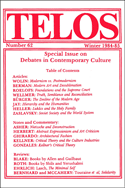 The notion of “high culture” has been under attack in different ways by critics, academics, and the general public for generations. Moreover, as Western culture becomes increasingly commercialized, egalitarian impulses have exiled much of what was considered by many to be high culture to obscurity, appreciated mainly by a minority who are themselves regarded as cultural elitists. Popular or mass culture appears to now reign supreme, but this does not mean that cultural hierarchy has been brought to an end. Cultural hierarchy still has its defenders, and as Martin Jay suggests in his 1984 Telos article “Hierarchy and the Humanities: The Radical Implications of a Conservative Idea,” it clearly has a place in current cultural evaluations. The notion of “high culture” has been under attack in different ways by critics, academics, and the general public for generations. Moreover, as Western culture becomes increasingly commercialized, egalitarian impulses have exiled much of what was considered by many to be high culture to obscurity, appreciated mainly by a minority who are themselves regarded as cultural elitists. Popular or mass culture appears to now reign supreme, but this does not mean that cultural hierarchy has been brought to an end. Cultural hierarchy still has its defenders, and as Martin Jay suggests in his 1984 Telos article “Hierarchy and the Humanities: The Radical Implications of a Conservative Idea,” it clearly has a place in current cultural evaluations.
Continue reading →
By Robert Wyllie · Tuesday, January 14, 2014 As an occasional feature on TELOSscope, we highlight a past Telos article whose critical insights continue to illuminate our thinking and challenge our assumptions. Today, Robert Wyllie looks at Norberto Bobbio’s “Is There a Marxist Theory of the State?” from Telos 35 (Spring 1978).
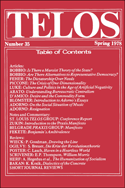 Norberto Bobbio’s 1978 article “Is There a Marxist Theory of the State?” marks a turning point in the history of Telos. The “red decade” was coming to a close in the mid-1970s, and the New Left was falling into disarray. Hence, Bobbio writes an epitaph in this 1978 article, which makes the convincing case that the Left was never able to develop a political theory that included a positive concept of the political state. In the years following Bobbio’s article, the Telos group would begin to look elsewhere. As Paul Piccone and Gary Ulmen later explained, “Telos‘ initial interest in [Carl] Schmitt’s work was triggered in the 1980s by the realization, in the collapse of the New Left and under the influence of Norberto Bobbio’s criticism, that the Left in general and Marxism in particular had no political theory.”[1] Bobbio moved Telos away from “revolution, dialectic, commodity fetishism, liberation, alienation, and monopoly capitalism”[2] to Carl Schmitt, federalism, and populism. Norberto Bobbio’s 1978 article “Is There a Marxist Theory of the State?” marks a turning point in the history of Telos. The “red decade” was coming to a close in the mid-1970s, and the New Left was falling into disarray. Hence, Bobbio writes an epitaph in this 1978 article, which makes the convincing case that the Left was never able to develop a political theory that included a positive concept of the political state. In the years following Bobbio’s article, the Telos group would begin to look elsewhere. As Paul Piccone and Gary Ulmen later explained, “Telos‘ initial interest in [Carl] Schmitt’s work was triggered in the 1980s by the realization, in the collapse of the New Left and under the influence of Norberto Bobbio’s criticism, that the Left in general and Marxism in particular had no political theory.”[1] Bobbio moved Telos away from “revolution, dialectic, commodity fetishism, liberation, alienation, and monopoly capitalism”[2] to Carl Schmitt, federalism, and populism.
Continue reading →
By Robert Ramos · Friday, January 3, 2014 As an occasional feature on TELOSscope, we highlight a past Telos article whose critical insights continue to illuminate our thinking and challenge our assumptions. Today, Robert Ramos looks at Jonathan Blair’s’s “Context, Event, Politics: Recovering the Political in the Work of Jacques Derrida” from Telos 141 (Winter 2007).
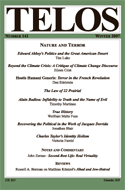 In “Context, Event, Politics: Recovering the Political in the Work of Jacques Derrida,” Jonathan Blair asks us to reconsider the standard narrative that has been used to categorize and also mischaracterize Derrida’s work. This is the position that Derrida’s early work begins with the institution of deconstruction and that at a point in the late 1980s Derrida’s thinking experienced a shift or a turn from deconstruction and to an explicit focus on the ethical and the political. Against this narrative, Blair argues that the question of politics appears as early as 1970. In “Context, Event, Politics: Recovering the Political in the Work of Jacques Derrida,” Jonathan Blair asks us to reconsider the standard narrative that has been used to categorize and also mischaracterize Derrida’s work. This is the position that Derrida’s early work begins with the institution of deconstruction and that at a point in the late 1980s Derrida’s thinking experienced a shift or a turn from deconstruction and to an explicit focus on the ethical and the political. Against this narrative, Blair argues that the question of politics appears as early as 1970.
Continue reading →
By Matt Applegate · Tuesday, December 17, 2013 As an occasional feature on TELOSscope, we highlight a past Telos article whose critical insights continue to illuminate our thinking and challenge our assumptions. Today, Matt Applegate looks at Yvette Biro’s “The Intellectual Film: Eisenstein’s Plan to Film Marx’s Capital“ from Telos 39 (Spring 1979).
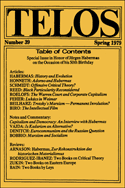 It is difficult to think of what cinema is in the present, and indeed, what cinema might be in the future, outside of large studio systems, box office opening numbers, and global profit intake. Even so-called “independent” films often circulate in a virtual minor league of the Hollywood studio system, vying for wide release. To be sure, cinema’s thorough commodification both limits its potential for aesthetic experimentation and makes it easier to equate it with other forms of media. When cinema becomes secondary to the metrics of profit, its distinct aesthetic qualities are subordinate to its function as a product comprised of moving images and sound. Moreover, as film moves away from celluloid and toward digital formats, one is compelled to ask what makes cinema distinct as visual technology is homogenized. This is not to say that cinematic experience and practice are bankrupt aesthetic qualities or that film is doomed to devolve into an indistinct mesh of CGI and user-generated websites like YouTube and Vine. Rather, as Yvette Biro suggests in her “The Intellectual Film: Eisenstein’s Plan to Film Marx’s Capital,” the horizon of cinematic thought and practice is perhaps best imagined by examining the relation between ideology and cinematic aesthetics. It is difficult to think of what cinema is in the present, and indeed, what cinema might be in the future, outside of large studio systems, box office opening numbers, and global profit intake. Even so-called “independent” films often circulate in a virtual minor league of the Hollywood studio system, vying for wide release. To be sure, cinema’s thorough commodification both limits its potential for aesthetic experimentation and makes it easier to equate it with other forms of media. When cinema becomes secondary to the metrics of profit, its distinct aesthetic qualities are subordinate to its function as a product comprised of moving images and sound. Moreover, as film moves away from celluloid and toward digital formats, one is compelled to ask what makes cinema distinct as visual technology is homogenized. This is not to say that cinematic experience and practice are bankrupt aesthetic qualities or that film is doomed to devolve into an indistinct mesh of CGI and user-generated websites like YouTube and Vine. Rather, as Yvette Biro suggests in her “The Intellectual Film: Eisenstein’s Plan to Film Marx’s Capital,” the horizon of cinematic thought and practice is perhaps best imagined by examining the relation between ideology and cinematic aesthetics.
Continue reading →
By Beau Mullen · Tuesday, December 10, 2013 As an occasional feature on TELOSscope, we highlight a past Telos article whose critical insights continue to illuminate our thinking and challenge our assumptions. Today, Beau Mullen looks at Norman Naimark’s “Totalitarian States and the History of Genocide” from Telos 136 (Fall 2006).
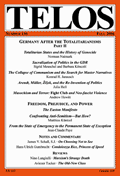 The twentieth century was witness to no shortage of political violence and mass death perpetrated by the state. The two most well-known genocides of the century—those that occurred under the rule of Nazi Germany and the Stalinist Soviet Union—did not occur because the state broke down and lawlessness prevailed. Quite the contrary: both regimes had complete control over their citizenry, and the apparatus of government was used to make the butchery as efficient and as inescapable as possible. Both regimes were characterized by extreme violence and terror, key elements of the totalitarian system as defined by Hannah Arendt, so it seems only logical that totalitarianism increases the potential for genocide. The twentieth century was witness to no shortage of political violence and mass death perpetrated by the state. The two most well-known genocides of the century—those that occurred under the rule of Nazi Germany and the Stalinist Soviet Union—did not occur because the state broke down and lawlessness prevailed. Quite the contrary: both regimes had complete control over their citizenry, and the apparatus of government was used to make the butchery as efficient and as inescapable as possible. Both regimes were characterized by extreme violence and terror, key elements of the totalitarian system as defined by Hannah Arendt, so it seems only logical that totalitarianism increases the potential for genocide.
Continue reading →
By Linas Jokubaitis · Tuesday, December 3, 2013 As an occasional feature on TELOSscope, we highlight a past Telos article whose critical insights continue to illuminate our thinking and challenge our assumptions. Today, Linas Jokubaitis looks at Joseph Bendersky’s “Carl Schmitt and the Conservative Revolution” from Telos 72 (Summer 1987).
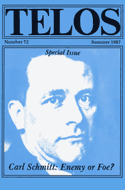 In his last book, Political Theology II, Carl Schmitt wrote that some books are fated to become academic legends, but contrary to the etymological meaning of the word Legende, they are not read, only cited. He knew that his persona was surrounded by many mythologies and that after his death an even greater complex of mythologies would develop around his personality and works. Today there seems to be no end to the multiplication of legends about Schmitt. Joseph Bendersky’s essay “Carl Schmitt and the Conservative Revolution” is a meticulous attempt to understand if there is any truth in the popular legend, according to which Schmitt belonged to a diverse group of intellectuals who were labeled as conservative revolutionaries. In his last book, Political Theology II, Carl Schmitt wrote that some books are fated to become academic legends, but contrary to the etymological meaning of the word Legende, they are not read, only cited. He knew that his persona was surrounded by many mythologies and that after his death an even greater complex of mythologies would develop around his personality and works. Today there seems to be no end to the multiplication of legends about Schmitt. Joseph Bendersky’s essay “Carl Schmitt and the Conservative Revolution” is a meticulous attempt to understand if there is any truth in the popular legend, according to which Schmitt belonged to a diverse group of intellectuals who were labeled as conservative revolutionaries.
Continue reading →
|
|
 The notion of “high culture” has been under attack in different ways by critics, academics, and the general public for generations. Moreover, as Western culture becomes increasingly commercialized, egalitarian impulses have exiled much of what was considered by many to be high culture to obscurity, appreciated mainly by a minority who are themselves regarded as cultural elitists. Popular or mass culture appears to now reign supreme, but this does not mean that cultural hierarchy has been brought to an end. Cultural hierarchy still has its defenders, and as Martin Jay suggests in his 1984 Telos article “Hierarchy and the Humanities: The Radical Implications of a Conservative Idea,” it clearly has a place in current cultural evaluations.
The notion of “high culture” has been under attack in different ways by critics, academics, and the general public for generations. Moreover, as Western culture becomes increasingly commercialized, egalitarian impulses have exiled much of what was considered by many to be high culture to obscurity, appreciated mainly by a minority who are themselves regarded as cultural elitists. Popular or mass culture appears to now reign supreme, but this does not mean that cultural hierarchy has been brought to an end. Cultural hierarchy still has its defenders, and as Martin Jay suggests in his 1984 Telos article “Hierarchy and the Humanities: The Radical Implications of a Conservative Idea,” it clearly has a place in current cultural evaluations.  Norberto Bobbio’s 1978 article “Is There a Marxist Theory of the State?” marks a turning point in the history of Telos. The “red decade” was coming to a close in the mid-1970s, and the New Left was falling into disarray. Hence, Bobbio writes an epitaph in this 1978 article, which makes the convincing case that the Left was never able to develop a political theory that included a positive concept of the political state. In the years following Bobbio’s article, the Telos group would begin to look elsewhere. As Paul Piccone and Gary Ulmen later explained, “Telos‘ initial interest in [Carl] Schmitt’s work was triggered in the 1980s by the realization, in the collapse of the New Left and under the influence of Norberto Bobbio’s criticism, that the Left in general and Marxism in particular had no political theory.”[1] Bobbio moved Telos away from “revolution, dialectic, commodity fetishism, liberation, alienation, and monopoly capitalism”[2] to Carl Schmitt, federalism, and populism.
Norberto Bobbio’s 1978 article “Is There a Marxist Theory of the State?” marks a turning point in the history of Telos. The “red decade” was coming to a close in the mid-1970s, and the New Left was falling into disarray. Hence, Bobbio writes an epitaph in this 1978 article, which makes the convincing case that the Left was never able to develop a political theory that included a positive concept of the political state. In the years following Bobbio’s article, the Telos group would begin to look elsewhere. As Paul Piccone and Gary Ulmen later explained, “Telos‘ initial interest in [Carl] Schmitt’s work was triggered in the 1980s by the realization, in the collapse of the New Left and under the influence of Norberto Bobbio’s criticism, that the Left in general and Marxism in particular had no political theory.”[1] Bobbio moved Telos away from “revolution, dialectic, commodity fetishism, liberation, alienation, and monopoly capitalism”[2] to Carl Schmitt, federalism, and populism.  In “Context, Event, Politics: Recovering the Political in the Work of Jacques Derrida,” Jonathan Blair asks us to reconsider the standard narrative that has been used to categorize and also mischaracterize Derrida’s work. This is the position that Derrida’s early work begins with the institution of deconstruction and that at a point in the late 1980s Derrida’s thinking experienced a shift or a turn from deconstruction and to an explicit focus on the ethical and the political. Against this narrative, Blair argues that the question of politics appears as early as 1970.
In “Context, Event, Politics: Recovering the Political in the Work of Jacques Derrida,” Jonathan Blair asks us to reconsider the standard narrative that has been used to categorize and also mischaracterize Derrida’s work. This is the position that Derrida’s early work begins with the institution of deconstruction and that at a point in the late 1980s Derrida’s thinking experienced a shift or a turn from deconstruction and to an explicit focus on the ethical and the political. Against this narrative, Blair argues that the question of politics appears as early as 1970.  It is difficult to think of what cinema is in the present, and indeed, what cinema might be in the future, outside of large studio systems, box office opening numbers, and global profit intake. Even so-called “independent” films often circulate in a virtual minor league of the Hollywood studio system, vying for wide release. To be sure, cinema’s thorough commodification both limits its potential for aesthetic experimentation and makes it easier to equate it with other forms of media. When cinema becomes secondary to the metrics of profit, its distinct aesthetic qualities are subordinate to its function as a product comprised of moving images and sound. Moreover, as film moves away from celluloid and toward digital formats, one is compelled to ask what makes cinema distinct as visual technology is homogenized. This is not to say that cinematic experience and practice are bankrupt aesthetic qualities or that film is doomed to devolve into an indistinct mesh of CGI and user-generated websites like YouTube and Vine. Rather, as Yvette Biro suggests in her “The Intellectual Film: Eisenstein’s Plan to Film Marx’s Capital,” the horizon of cinematic thought and practice is perhaps best imagined by examining the relation between ideology and cinematic aesthetics.
It is difficult to think of what cinema is in the present, and indeed, what cinema might be in the future, outside of large studio systems, box office opening numbers, and global profit intake. Even so-called “independent” films often circulate in a virtual minor league of the Hollywood studio system, vying for wide release. To be sure, cinema’s thorough commodification both limits its potential for aesthetic experimentation and makes it easier to equate it with other forms of media. When cinema becomes secondary to the metrics of profit, its distinct aesthetic qualities are subordinate to its function as a product comprised of moving images and sound. Moreover, as film moves away from celluloid and toward digital formats, one is compelled to ask what makes cinema distinct as visual technology is homogenized. This is not to say that cinematic experience and practice are bankrupt aesthetic qualities or that film is doomed to devolve into an indistinct mesh of CGI and user-generated websites like YouTube and Vine. Rather, as Yvette Biro suggests in her “The Intellectual Film: Eisenstein’s Plan to Film Marx’s Capital,” the horizon of cinematic thought and practice is perhaps best imagined by examining the relation between ideology and cinematic aesthetics.  The twentieth century was witness to no shortage of political violence and mass death perpetrated by the state. The two most well-known genocides of the century—those that occurred under the rule of Nazi Germany and the Stalinist Soviet Union—did not occur because the state broke down and lawlessness prevailed. Quite the contrary: both regimes had complete control over their citizenry, and the apparatus of government was used to make the butchery as efficient and as inescapable as possible. Both regimes were characterized by extreme violence and terror, key elements of the totalitarian system as defined by Hannah Arendt, so it seems only logical that totalitarianism increases the potential for genocide.
The twentieth century was witness to no shortage of political violence and mass death perpetrated by the state. The two most well-known genocides of the century—those that occurred under the rule of Nazi Germany and the Stalinist Soviet Union—did not occur because the state broke down and lawlessness prevailed. Quite the contrary: both regimes had complete control over their citizenry, and the apparatus of government was used to make the butchery as efficient and as inescapable as possible. Both regimes were characterized by extreme violence and terror, key elements of the totalitarian system as defined by Hannah Arendt, so it seems only logical that totalitarianism increases the potential for genocide.  In his last book, Political Theology II, Carl Schmitt wrote that some books are fated to become academic legends, but contrary to the etymological meaning of the word Legende, they are not read, only cited. He knew that his persona was surrounded by many mythologies and that after his death an even greater complex of mythologies would develop around his personality and works. Today there seems to be no end to the multiplication of legends about Schmitt. Joseph Bendersky’s essay “Carl Schmitt and the Conservative Revolution” is a meticulous attempt to understand if there is any truth in the popular legend, according to which Schmitt belonged to a diverse group of intellectuals who were labeled as conservative revolutionaries.
In his last book, Political Theology II, Carl Schmitt wrote that some books are fated to become academic legends, but contrary to the etymological meaning of the word Legende, they are not read, only cited. He knew that his persona was surrounded by many mythologies and that after his death an even greater complex of mythologies would develop around his personality and works. Today there seems to be no end to the multiplication of legends about Schmitt. Joseph Bendersky’s essay “Carl Schmitt and the Conservative Revolution” is a meticulous attempt to understand if there is any truth in the popular legend, according to which Schmitt belonged to a diverse group of intellectuals who were labeled as conservative revolutionaries. 

